
A convenience store, bodega, convenience shop, corner store or corner shop is a small retail store that stocks a range of everyday items such as coffee, groceries, fruits, vegetables, snacks, confectionery, soft drinks, ice creams, tobacco products, lottery tickets, over-the-counter drugs, toiletries, newspapers and magazines. In some jurisdictions, convenience stores are licensed to sell alcoholic drinks, although many jurisdictions limit such beverages to those with relatively low alcohol content, like beer and wine. The stores may also offer money order and wire transfer services, along with the use of a fax machine or photocopier for a small per-copy cost. Some also sell tickets or recharge smart cards, e.g. OPUS cards in Montreal or include a small deli. They differ from general stores and village shops in that they are not in a rural location and are used as a convenient supplement to larger stores.
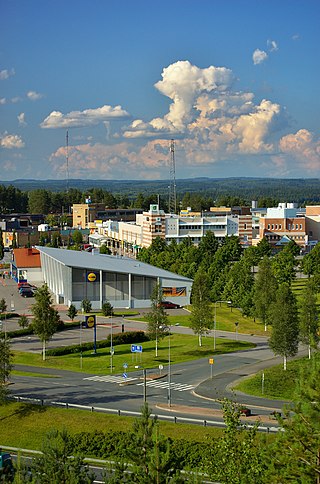
A supermarket is a self-service shop offering a wide variety of food, beverages and household products, organized into sections. This kind of store is larger and has a wider selection than earlier grocery stores, but is smaller and more limited in the range of merchandise than a hypermarket or big-box market. In everyday U.S. usage, however, "grocery store" is often used to mean "supermarket".
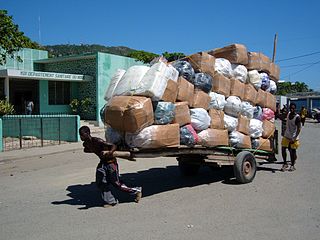
A cart or dray is a vehicle designed for transport, using two wheels and normally pulled by one or a pair of draught animals. A handcart is pulled or pushed by one or more people.

A shopping cart, trolley, or buggy, also known by a variety of other names, is a wheeled cart supplied by a shop or store, especially supermarkets, for use by customers inside the premises for transport of merchandise as they move around the premises, while shopping, prior to heading to the checkout counter, cashiers or tills. Increasing the amount of goods a shopper can collect increases the quantities they are likely to purchase in a single trip, boosting store profitability.

Shoplifting, shop theft, retail theft, or retail fraud is the theft of goods from a retail establishment during business hours, typically by concealing a store item on one's person, in pockets, under clothes or in a bag, and leaving the store without paying. With clothing, shoplifters may put on items from the store and leave the store wearing the clothes. The terms shoplifting and shoplifter are not usually defined in law. The crime of shoplifting generally falls under the legal classification of larceny. Shoplifting is distinct from burglary, robbery, or armed robbery. In the retail industry, the word shrinkage can be used to refer to merchandise lost by shoplifting, but the word also includes loss by other means, such as waste, uninsured damage to products and theft by store employees.
A no-frills or no frills service or product is one for which the non-essential features have been removed to keep the price low. The term "frills" originally refers to a style of fabric decoration. Something offered to customers for no additional charge may be designated as a "frill" – for example, free drinks on airline journeys, or a radio installed in a rental car. No-frills businesses operate on the principle that by removing luxurious additions, customers may be offered lower prices.

Online shopping is a form of electronic commerce which allows consumers to directly buy goods or services from a seller over the Internet using a web browser or a mobile app. Consumers find a product of interest by visiting the website of the retailer directly or by searching among alternative vendors using a shopping search engine, which displays the same product's availability and pricing at different e-retailers. As of 2020, customers can shop online using a range of different computers and devices, including desktop computers, laptops, tablet computers and smartphones.
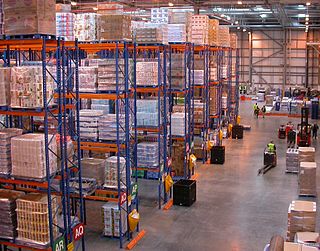
A distribution center for a set of products is a warehouse or other specialized building, often with refrigeration or air conditioning, which is stocked with products (goods) to be redistributed to retailers, to wholesalers, or directly to consumers. A distribution center is a principal part, the order processing element, of the entire order fulfillment process. Distribution centers are usually thought of as being demand driven. A distribution center can also be called a warehouse, a DC, a fulfillment center, a cross-dock facility, a bulk break center, and a package handling center. The name by which the distribution center is known is commonly based on the purpose of the operation. For example, a "retail distribution center" normally distributes goods to retail stores, an "order fulfillment center" commonly distributes goods directly to consumers, and a cross-dock facility stores little or no product but distributes goods to other destinations.

Plastic shopping bags, carrier bags, or plastic grocery bags are a type of plastic bag used as shopping bags and made from various kinds of plastic. In use by consumers worldwide since the 1960s, these bags are sometimes called single-use bags, referring to carrying items from a store to a home. However, it is rare for bags to be worn out after single use and in the past some retailers incentivised customers to reuse 'single use' bags by offering loyalty points to those doing so. Even after they are no longer used for shopping, reuse for storage or trash is common, and modern plastic shopping bags are increasingly recyclable or compostable. In recent decades, numerous countries have introduced legislation restricting the provision of plastic bags, in a bid to reduce littering and plastic pollution.
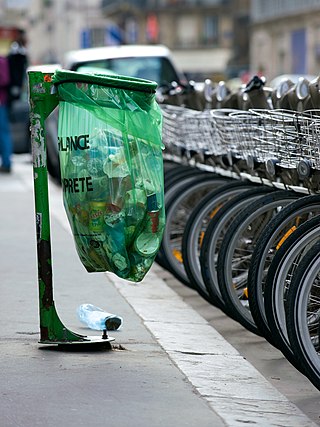
A plastic bag, poly bag, or pouch is a type of container made of thin, flexible, plastic film, nonwoven fabric, or plastic textile. Plastic bags are used for containing and transporting goods such as foods, produce, powders, ice, magazines, chemicals, and waste. It is a common form of packaging.
Bagger, packer, sacker or bag boy (US) is an unofficial title given to a courtesy clerk at a grocery store.

A toolbox is a box to organize, carry, and protect the owner's tools. They could be used for trade, a hobby or DIY, and their contents vary with the craft.
No Frills is a Canadian chain of discount supermarkets, owned by Loblaw Companies Limited, a subsidiary of George Weston Limited. There are over 200 franchise stores located in nine Canadian provinces.

Self-checkouts (SCOs), also known as assisted checkouts (ACOs) or self-service checkouts, are machines that provide a mechanism for customers to complete their own transaction from a retailer without needing a traditional staffed checkout. When using SCOs, customers scan item barcodes before paying for their total shop without needing one-to-one staff assistance. Self-checkouts are used mainly in supermarkets, although they are not uncommon in department or convenience stores. Most self-checkout areas are supervised by at least one staff member, often assisting customers process transactions, correcting prices, or otherwise providing service.

Woodman's Markets is an employee-owned American regional supermarket chain based in Janesville, Wisconsin. Founded in 1919 as a produce stand, Woodman's has grown to operate nineteen stores in Wisconsin and northern Illinois. Woodman's appeared on Supermarket News Top 50 Small Chains & Independents list since 2010. Most Woodman's locations are open 24 hours a day and have a gas station/convenience store close to the main building.
Shopping cart software is a piece of e-commerce software on a web server that allows visitors to have an Internet site to select items for eventual purchase.
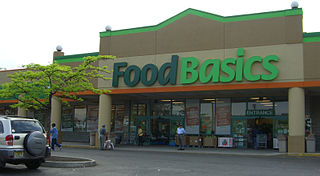
Food Basics was a no-frills discount supermarket chain owned and operated by The Great Atlantic & Pacific Tea Company in the northeastern United States.

Baggage carts, luggage carts, luggage trolleys or trolleys are small vehicles pushed by travelers (human-powered) to carry individual luggage, mostly suitcases. There are two major sizes: One for big luggage and one for small luggage. Carts have usually two parts for carrying luggage: A small section (basket) for carry on luggage at the same level as the handle, and a lowered large section for suitcases a small and large bags.
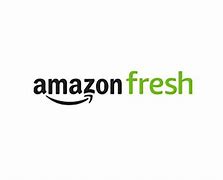
Amazon Fresh is a subsidiary of the American e-commerce company Amazon in Seattle, Washington. It is a grocery retailer with physical stores and delivery services in most major U.S. cities, as well as some international cities, such as Berlin, Hamburg, London, Milan, Munich, Rome, Tokyo, and some other locations in Singapore and India.

A bag is a common tool in the form of a non-rigid container, typically made of cloth, leather, or other materials. The use of bags predates recorded history, with the earliest bags being lengths of animal skin, cotton, or woven plant fibers, folded up at the edges and secured in that shape with strings of the same material. Bags are used for carrying items like personal belongings, groceries, or other objects. They comes in various shapes and sizes, often equipped with handles or straps for easy carrying.


















